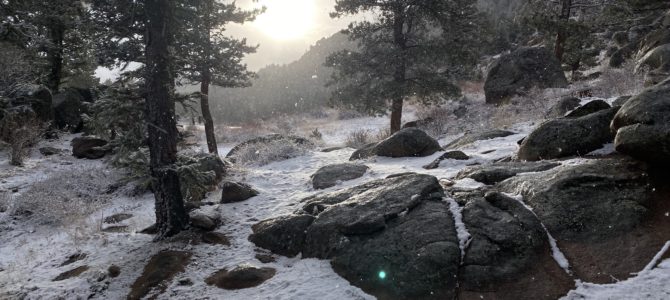I went camping last weekend, or at least I tried.
On Saturday, I embarked with a pair of friends on a wilderness trip about two hours northwest of Boulder, Colorado. Our plan was simple: set up an entire outdoor kitchen and cook a gourmet dinner by dusk. We didn’t make it to sunset.
After the kitchen was set, charcuterie was out, and the hot cider was adequately spiked, the snow rained from the heavens.
It wasn’t the snow that turned us back. We came prepared, as always. In fact, the snowfall was a welcome season’s greeting in the run-up to Thanksgiving. There’s a certain majesty to powder-white snow falling gracefully over the jagged Colorado peaks, offering a solitude in the region that’s hard to come by in the tourist-heavy summer months.

But when we discovered a sleeping bag was missing, it was an easy decision to turn around and abandon the trip. We could handle cooking in the snow, but we couldn’t handle being down a sleeping bag, not in the conditions we were presented.
I slept during the two hours back to Boulder. When we arrived where we started, a mountainside home overlooking the northern suburbs of Denver where one of my friends lived, we cooked our food and polished off our drinks with a fraction of the effort that would’ve been required in the snow — and remarkably less effort when compared to the Pilgrims at Plymouth.
At the end of the evening, I found myself in a hot tub gazing across the sprawling lights of the Denver metropolitan area. I couldn’t help but consider how none of it existed 400 years ago, not even the light bulb. I also couldn’t help but consider the hardship of those who made it all possible.
The first Thanksgiving was just as much a celebration of abundance as it was a relief from loss.
The Pilgrims who arrived at what became the Massachusetts Bay Colony four centuries ago almost didn’t make it through their first New England winter. By the end of their first year, half of those who embarked on the Mayflower had been lost. Having arrived in November, the Pilgrims’ late-season exit forced the settlers to build under conditions far more treacherous than what forced a pair of friends and me to retreat from the mountains.
The Pilgrims had to ferry supplies to and from the Massachusetts coast and wade in freezing seawater to and from their primary vessel, with the Mayflower anchored a mile from shore. Death, disease, and despair would grip the settlement for months, as the colonists died in droves during the dark first months of the new year. They also died as heroes whose experiment in self-government paved the way for a new nation just 150 years later.
The story of the first Pilgrims in Massachusetts is the story of a civilization’s rise that would do more to alleviate human suffering than ever before in human history. Over the course of 250 years, the United States would lead global liberation efforts and drive innovation with new technology to power the world through the 21st century. Few, if any under the lights below the Boulder mountaintop, were subject to the cold Colorado conditions on Saturday night, each protected by the comfort of their homes kept warm and lit by fossil fuels.
It’s odd that there’s a contemporary movement underway to write off Pilgrim history as one to “mourn” rather than celebrate, seemingly oblivious to the fact life expectancy would remain below 50-years-old absent American development. Those who claim the entire continent was built on “stolen land” often conveniently omit the stories behind indigenous ownership, featuring rival tribes at constant war and stealing from each other.
Without colonization, the lights in Boulder would have remained off last weekend.









